| | |  | Geena Davis News & Gossip
|
|
| | Geena Davis describes how Bill Murray harassed her on set in 1990 | | Added 3 years ago | Source: CeleBitchy |
|
|
|
|
|
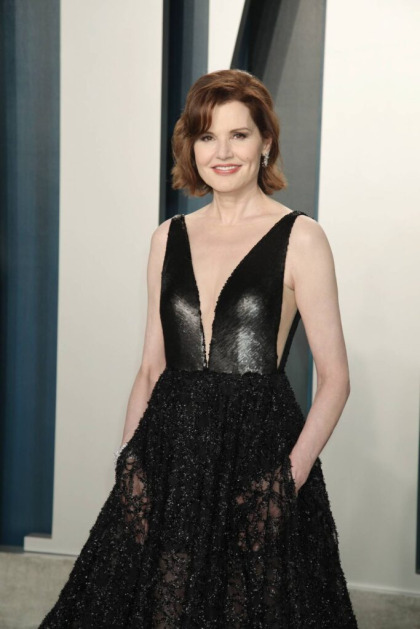
Geena Davis released her first book yesterday. That surprised me, I thought she?d published a memoir before. The book is called Dying of Politeness: A Memoir and talks about Geena?s journey from childhood to Hollywood. As you can imagine, shes seen her fair share of misogyny and harassment. Much of the gender inequality is what led her to start The Geena Davis Institute on Gender in Media. She writes about working with Bill Murray in 1990?s Quick Change. Geena was about 34 at the time and Bill was about 40. She said that in their first meeting, which took place in a hotel room, Bill acted creepy with a massager and wouldn?t take no for an answer. Then, on set, he shouted at Geena for being late when she had a perfectly good reason and continued to scream at her in front of everyone as she walked to set.
In her upcoming memoir ?Dying of Politeness,? Geena Davis alleges a toxic experience working with Bill Murray on the 1990 film ?Quick Change.? She accuses Murray of behaving inappropriately toward her during her initial audition and then being overly aggressive with her on set.
The actress elaborated on the experience in a new interview with The Times (UK). The publication offered the following summary of her description of working with Murray in the book: ?She?s introduced to [Murray], she writes, in a hotel suite, where Murray greets her with something called The Thumper, a massage device he insists on using on her, despite her emphatically refusing; later, while they?re filming on location, Murray tracks Davis down in her trailer and begins screaming at her for being late (she?s waiting for her wardrobe), continues to scream at her as she hurries onto the set and even as she gets there, in front of hundreds of cast, crew, curious passers-by.?
?That was bad,? Davis said in the interview. ?The way he behaved at the first meeting? I should have walked out of that or profoundly defended myself, in which case I wouldn?t have got the part. I could have avoided that treatment if I?d known how to react or what to do during the audition. But, you know, I was so non-confrontational that I just didn?t.?
Davis went on to say that she regrets blaming herself, as the consequences for the inappropriate behavior should land on Murray.
?There?s no point in regretting things, and yet, here I was regretting,? she said. ?It wasn?t my fault.?
[From IndieWire via Pajiba]
I mention Geena and Murray?s ages because she wasn?t a child, and he wasn?t that much older. By Quick Change, Geena had been a working actress for a decade and won her Oscar. She was perfectly established but Murray felt he had every right to lord power over her. It cinches my heart to read Geena saying she blamed herself for not managing the behavior. That?s what women were trained to do. If a man?s behavior went off the rails, we were conditioned to look at our part in making that happen. Hopefully that has changed and we are no longer teaching young women to blame themselves.
I was looking for a reason to talk about the film The Greatest Beer Run Ever this week. It is so much better than you think it is, don?t write it off because of what you think the title suggests. But one of the things I wanted to praise was Murray?s performance. And now I don?t, because it doesn?t matter knowing that he behaved this way, and everyone just allowed it because he made them laugh and bought some baseball tickets. What?s worse, his victims like Geena, Lucy Liu, and those folks on Being Mortal were made into the bad guy because they dared to speak out against Mr. Groundhog Day. Beer Run is still a really good movie, and all the performances are good. Murray?s role is small. Follow it is up with A League of Their Own or The Long Kiss Goodnight with Geena and some guys that don?t have bad press.
Embed from Getty Images
|
| |
|
|
|
|
|
|
| | Geena Davis: An actor 20 years older called me too old to play his love interest | | Added 3 years ago | Source: CeleBitchy |
|
|
|
|
|
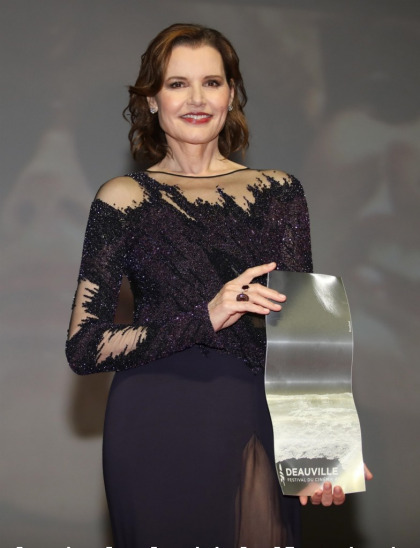
Geena Davis is an interesting and complex person, but she?s usually asked the same questions in interviews. Even with her incredible Geena Davis Institute on Gender Media, shes usually just asked why she came up with it, which is a good question, but there are so many more to explore. I bet Geena will talk about her mistakes if somebody?d ask her, but they never do. While speaking on the Allison Interviews podcast, she was able to give a few new angles to her Thelma & Louise stories. One thing that is old news to most but new to me is that Geena wasn?t originally cast as Thelma. She had her agent badger the production team until Ridley Scott took over as director and agreed to meet with her. Geena also addressed ageism in Hollywood. She told a story about an actor she encountered, who was 20 years her senior, who told her she was too old to play his lover.
On how winning an Oscar affected how directors treated her: Speaking of winning the Oscar and does it change how people see you and everything, I had two directors, after I won the Oscar, who I had a rocky start with, because they assumed that I was going to think I was all that and they wanted to make sure I didn?t feel like I was all that. Without having met me or having spent any time with me or anything, they just assumed I was going to be like, ?Well, now no one is going to tell me what to do.?
I think maybe because I was a woman, that the directors felt that way. And maybe it was even unconscious bias that they would do it to a woman and not a man. But they didn?t want a woman to potentially cause them any problems. They wanted to make sure I knew my place, and it probably wouldn?t happen to a man.
On how she won her iconic role in Thelma & Louise & Brad Pitt: I had read the script for Thelma & Louise after it had already been cast. I thought, ?Oh my God! This is the best script I?ve ever read. I wish I could be in it.? I ended up having a year-long pursuit for the role, because Ridley Scott was only the producer at that time, and different directors and different pairings of ?Thelmas? and ?Louises? were coming together and falling apart. For a year, my agent called at least once a week to say, ?Just so you know, Geena is still available. She?s still interested.? Then when [Ridley Scott] decided he was going to direct it, he immediately said, ?Yes. Okay sure, I?ll meet with her,? and I convinced him somehow or another (laugh).
They then cast Brad Pitt to be my sort of?. love interest, and it wasn?t actually because he was younger. They didn?t purposely try to cast someone younger than me. He just gave the best audition and he was the best choice. But I thought that was pretty cool. He?s only, like, seven years younger than me, but I thought that was quite cool that they did that.
On ageism in Hollywood: It?s very strange and so prevalent. A certain male actor that was making a movie said that I was too old to be his romantic interest, and I was 20 years younger than him. You know what it is? Women peak in their 20s and 30s, and men peak in their 40s and 50s as far as actors go. So the male stars of the movies want to appear to be younger than they are, or they want to appeal to younger people, so they always want a co-star who is really young. That is why that happens and that is why women don?t get cast very much after 40 and 50. It is because they are felt to be too old to be a romantic interest.
[From Allison Interviews podcast]
Nothing here really shocked me, but I hadn?t necessarily heard it before. We?ve seen plenty of talented actresses win Oscars and their careers falter as a result. It wouldn?t surprise me if theyre labeled as hard to work with by directors who never met them just because theyd achieved recognition for their craft. Very little about the way Hollywood works towards women surprises me. I was curious who was originally cast or considered for Thelma & Louise, so I dug around. Michelle Pfeiffer and Jodie Foster were the first. Meryl Streep and Goldie Hawn pitched themselves as a pair but wanted to change the ending. Cher was seriously considered and honestly, Cher would have been great. Even though I was meh on T&L, it was beautifully cast. Including Brad. I agree with Geena that if they had not intended Thelma to have a younger lover and simply cast one because the actor seemed right, in 1991 that was actually progressive. Even if he was only seven years younger.
What Geena said about women on screen peaking in their 20s and 30s is still true today. It may have eased some, but not much. It?s not just movies, try finding a romance novel with a heroine over 40. They?re all gorgeous, uber-accomplished businesswomen at 27. And I don?t even need all the love interests to be over 40. Just that the women who are 40 or 50 in films and TV to be sexually interesting and not just mothers or buttoned-up sassy friends. As for Geena?s point about men insisting on younger love interests so they appear more desirable, well they?re just going to have to get over that. We?ve put up with that nonsense for too long.
Photo credit: Backgrid and Avalon Red
|
| |
|
|
|
|
|
|
| | Geena Davis: 'We are teaching kids to have unconscious gender bias' | | Added 6 years ago | Source: CeleBitchy |
|
|
|
|
|
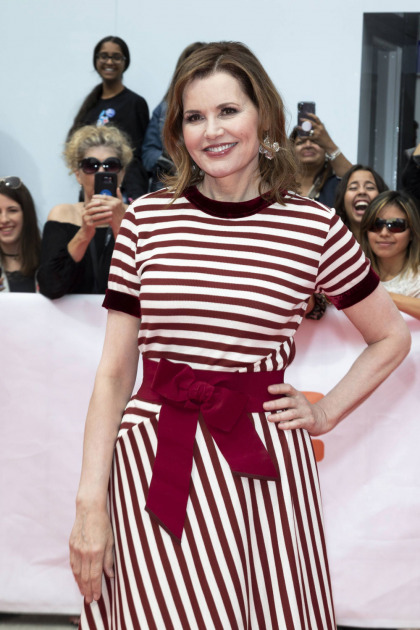
I?ve loved Geena Davis since I first saw her in Beetlejuice and A League of Their Own. (I wasn?t old enough to watch Thelma and Louise when it was released.) As much as I?ve loved Geena?s films, I?ve also been impressed with the work that Geena has done off-screen: In 2004, she founded the Geena Davis Institute on Gender in Media, which researches and works to change and make changes on gender bias on screen. On Monday, Geena was on TODAY promoting the documentary This Changes Everything, which addresses gender inequity in Hollywood:
On women?s portrayal on film
Images have an incredibly powerful impact, especially on careers. There?s something called the CSI effect. So many women are going into forensic science because of those shows.
On if Thelma and Louise was a turning point
It really changed my life. Nobody realized what a nerve it was going to strike. It showed me how few opportunities we give women to come out of a movie feeling empowered and excited.
On her new documentary and how men have to be on our side
How are we going to solve this problem if we ask the underrepresented to solve this problem themselves? It?s not going to work, we need to work together.
How this became meaningful to her [she?s about to get a humanitarian Oscar]
It started when my daughter was little and I noticed how few female characters there were in [shows] for kids. I realized we are teaching kids from the very beginning to have unconscious gender bias if we show that boys and men are more important, they take up more space. Why would we do that in the 21st century?
[From The Today Show]
Geena is ridiculously smart and talented and I?m so glad that she?s doing this work; I?m angry that it?s even necessary, but here we are. I was reminded of this infographic from the New York Film Academy about gender inequity in the movies, updated in 2018. In 900 top films produced from 2007?2016, just 30.5% of speaking characters were women. In almost 1,000 films examined in 2017 by AI, men had over 37,000 dialogues; women had a bit more than 15,000. The study found that in the majority of films, female roles are not central to the plot.? I?ll note here the obvious problem of framing all of these statistics as though only two genders and sexes exist, though the issue that gender inequity is a glaring problem in Hollywood comes through loud and clear. This Changes Everything premiered at the Toronto International Film Festival in 2018, and will be released in theaters and on-demand on Friday, August 9.
Embed from Getty Images
|
| |
|
|
|
|
|
|
| | Geena Davis does not get enough credit for her work for gender equality in media | | Added 8 years ago | Source: CeleBitchy |
|
|
|
|
|
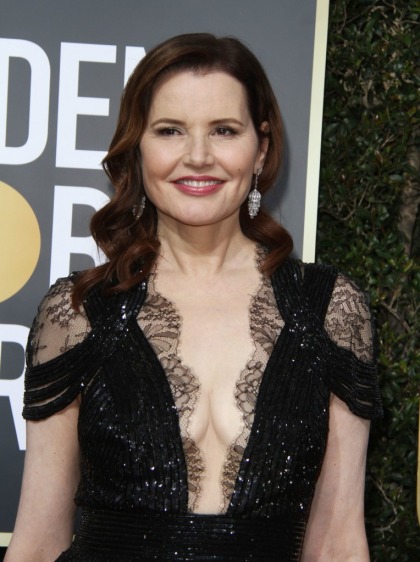
I wanted to make Geena Davis the headliner for this post because while her Thelma and Louise co-star (and co-presenter last night) Susan Sarandon is blustering and problematic, Geena does amazing work for gender equality in media, largely behind the scenes. People don’t say “oh wow Geena Davis is such an activist” because she’s boots-on-the-ground sponsoring research, meeting with media executives and running film festivals. She’s not giving bullsh-t quotes to promote herself like her buddy Sarandon. Geena started the Geena Davis Institute on Gender in Media in 2004, after she noticed a lack of girls and women in children’s television shows she was watching with her daughter. She’s since worked to bring awareness to this issue and to increase representation of girls and women in television and film. She also started the Betonville Film Festival in 2015, with a focus on diversity. So she’s been working in this area for years and making a difference.
Geena was in Monique Lhuillier, in a lace and sequin gown. The fringe at the bottom seems unnecessary, right? She looks incredible though.
Alison Brie had on a Vassilis Zoulias sweetheart neckline gown with a huge billowing skirt with pants underneath. I adore this gown, particularly with that amazing necklace, which is by Bulgari. When Alison was being interviewed by Giuliana Rancic she said “tonight is about wearing the pants so I?m literally wearing the pants.” She also talked about supporting all victims, including those who have not publicly told their stories yet. Alison’s new husband, Dave Franco, was there with his brother, James (who won best actor for Disaster Artist). Alison was getting interviewed by Giuliana at the same time that James and Dave were being interviewed by Ryan Seacrest. They saw each other over the monitors and Dave’s face lit up when Alison came on. He was so happy to see her and it was sweet.
Samira Wiley rocked this Romona Keve?a gown which had like a geometric inverted necklace made up of wired-together leaf-like shapes in shades of gold. I kept staring at it when she was on stage for Handmaid’s Tale, which won for Best Television Series – Drama. It’s a plain dress with built-in jewelry and I want it! Samira was there with her wife of nearly a year, Lauren Morelli.
photos credit: WENN and Pacific Coast News
More Photos Here
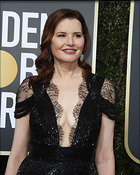 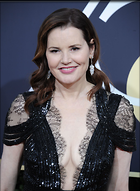 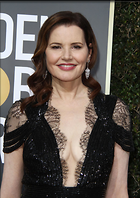 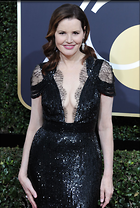 |
| |
|
|
|
|
|
|
| | Geena Davis: '13 yo female characters are as sexualized as 39 yo characters' | | Added 8 years ago | Source: CeleBitchy |
|
|
|
|
|
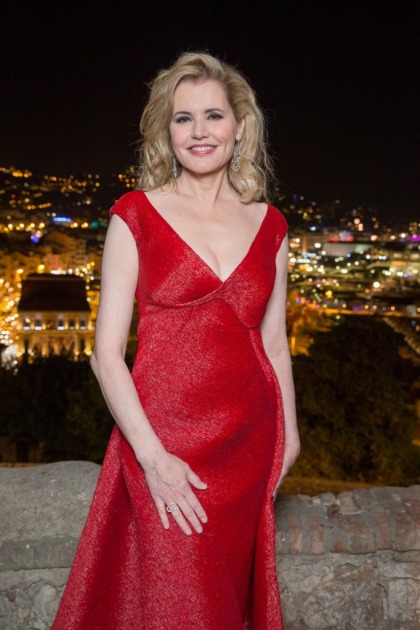
Embed from Getty Images
Geena Davis is fighting the good fight for women’s representation in film and the small screen with her nonprofit, The Geena Davis Institute on Gender in Media. The Geena Davis Institute works to increase awareness and make changes around issues like stereotyping, a dearth of women in key roles, and lack of women on screen. As part of that, they analyze films and television to get statistics on women on screem. I was about to take The Daily Mail to task for just focusing on how great Geena looked at the Sundance film festival (where she was promoting her Bentonville Film Festival). They also posted an interview where she dropped some pretty thought-provoking facts I thought would make a better subject for the story, but it’s one of those older interviews which outlets stick into new stories as filler. (I hate when they do that, but at least it’s not on autoplay.) Here’s what she said and again these quotes are old but I wanted to talk about them.
“Our research shows that female characters are highly sexualized. Our global research shows that 13 year-old characters are equally sexualized as 39 year-old characters, which is horribly destructive and disgusting. So we really need to discuss it” [From video on Daily Mail]
That’s so depressing to me. Part of me doesn’t believe it, but the Geena Davis Institute of course has the hard facts to back this up because facts matter despite what gaslighting leaders say. Representation and portrayal of women and girls matters too and by having the facts we can help call for change. That’s why certain segments of the population hate facts. See how that works?
Geena is also promoting Dear Angelica, a new 12 minute animated VR story for the Oculus Rift. It’s roughly based on her life and is about the love between a mother and daughter. It features the voices of Geena and Mae Whitman. You can see a quick video about it on YouTube. It premieres on the Oculus Rift on Friday. We have an HTC Vive, which is decent, but I so want to see this. There’s such a problem with the way women are portrayed in video games especially and projects like this help.
Embed from Getty Images
Photos credit: WENN, FameFlynet and Getty
|
| |
|
|
|
|
|
|
| | Geena Davis: family films feature one female speaking character to three males | | Added 10 years ago | Source: CeleBitchy |
|
|
|
|
|
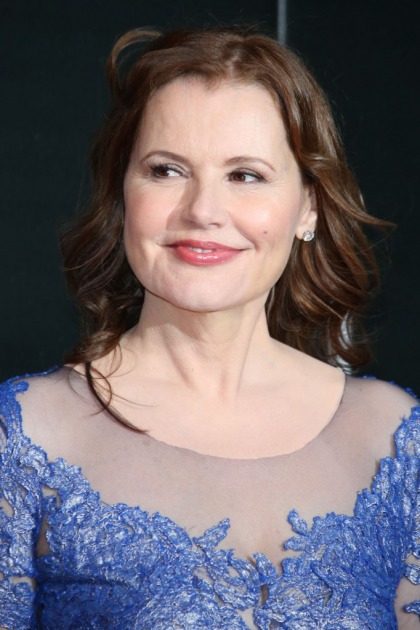
View image | gettyimages.com
A couple of weeks ago, I had the pleasure of covering Geena Davis’s interview with ET Online, in which she discussed her nonprofit organization, The Geena Davis Institute on Gender in Media. Geena, 59, explained that watching family shows with her three kids, twin boys age 11 and a 13 year-old daughter, helped her notice the lack of girls in children’s media. She started the Institute on Gender in Media to do fact-based research on the statistics behind gender representation on screen. Geena has been trying to educate people behind the scenes on the importance of more equal screen time and appropriate roles for women and girls. In a new essay on The Daily Beast, she goes in depth as to how this issue still exists, how studio execs have been in denial, and how she’s attempted to make changes. You can read her full essay on The Daily Beast and here are some excerpts:
On how no one thought there was a problem at first
The thing is, I didn?t plan then to become a big fat expert. I figured I would just mention it when I had meetings around town and see what people said. But when I asked directors, producers, and studio execs, ?Have you ever noticed how few female characters there are in G and PG-rated movies?? the response from every single person was, ?No, that?s been fixed.?
The statistics are sobering
In what we call family-rated films (G, PG and PG-13), for every one female speaking character, there are about three male speaking characters. And get this: the crowd scenes in these movies? live-action and animated?are made up of only 17 percent female characters. Seventeen percent? How does that even happen? The only reason I can think of is that Hollywood writers believe women don?t like to gather.
The roles for women are usually secondary
Of course it?s not just the quantity of female characters that?s shocking?it?s the quality as well. Women hold only 20 percent of the jobs, and it?s extremely rare that they?re a leader in any field. They?re profoundly sexualized, even in G-rated movies, and very often are simply the token female, or serve the function of eye candy. They are not having half of the adventures or doing half of the interesting things that male characters do.
How she was able to make changes
But there?s good news, too: things will change, and very soon. Once I had the data, I started visiting all the studios, networks, guilds, and production companies and presented the research to them in a private, collegial way. The reaction? Their jaws were on the floor. They had no idea they were leaving out that many female characters. Sure, they knew they were making fewer movies with female leads, but the fact that they were creating fictitious worlds nearly bereft of any female presence was big news to them. You might think it?s weird for creators not to realize what?s in their creations (or what?s left out of them), but think about it: they were all raised on the same ratio of male-to-female characters, and absorbed the same unconscious bias we all have.
[From The Daily Beast, headers added]
Geena said that a survey she conducted revealed that 68% of the people who heard her presentation said that it had prompted them to change 2 or more of their projects and that 41% said they had changed 4 or more projects as a result. She wrote that it’s still too early to tell, but that “when the needle does move, after nearly 7 decades of being completely stuck, it will be historic.” At least we’re having these conversations now, as frustrating as it seems that we need to still have them and that people deny there’s even an issue.
I would like to add another form of media in women are vastly underrepresented, serve as accessories and are unnecessarily sexualized: video games. My son is a gamer and I like to watch and follow the plot as he plays. He’s been playing Uncharted: The Nathan Drake Collection and I’m really disappointed in how that game portrays women. I can understand the lack of female characters in an historical context in which women’s roles were limited (i.e. Assassin’s Creed, can’t wait to see the new one), but in games set in present day this needs to change.
photo credit: WENN.com and Getty Images
More Photos Here
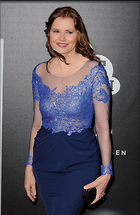 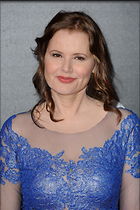 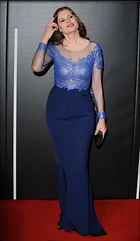 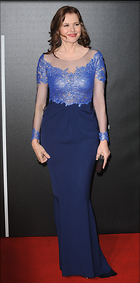 |
| |
|
|
|
|
| |
| | | 6.109.408
Photos Online+ 4.724 past week
3.639
Users Online | | |
| | | | | | | | We Salute
Demi Lovato
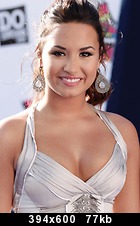
Photos of Demi Lovato will not count in your daily view limit, if you are a registered member
Tribute ends in
10 hours | | |
| | |
|